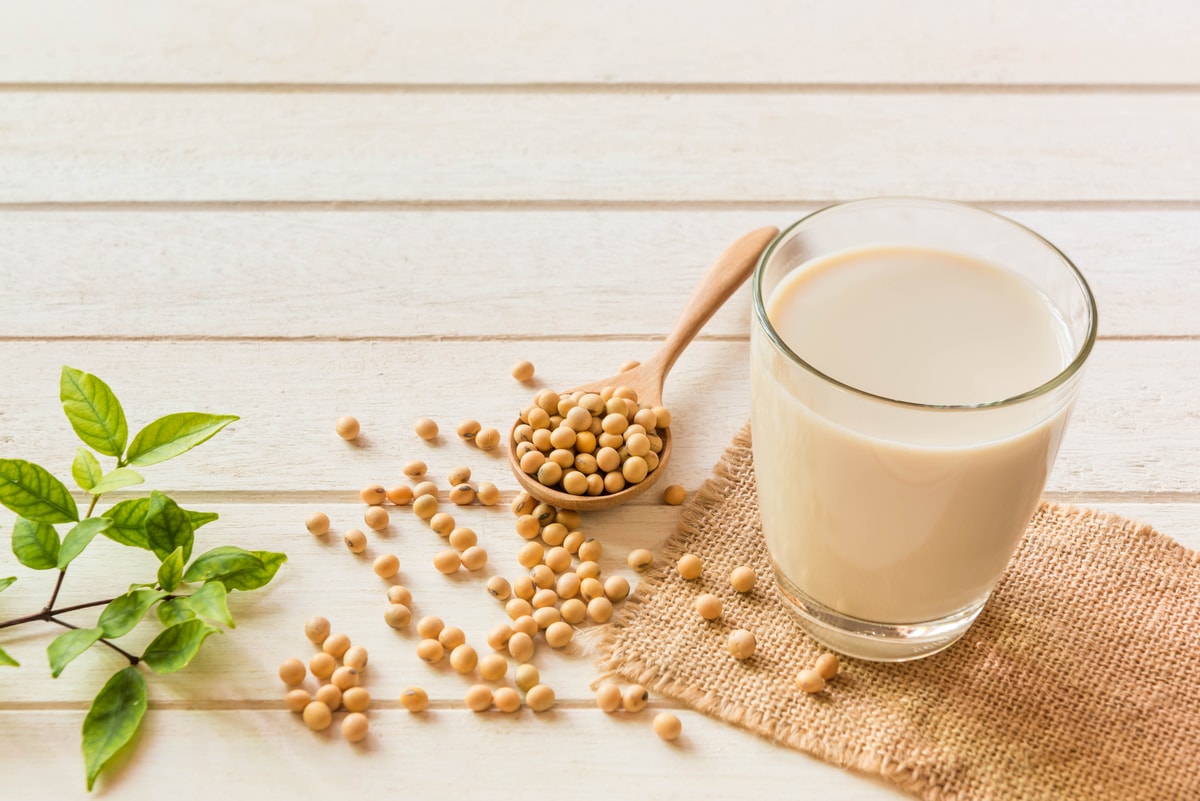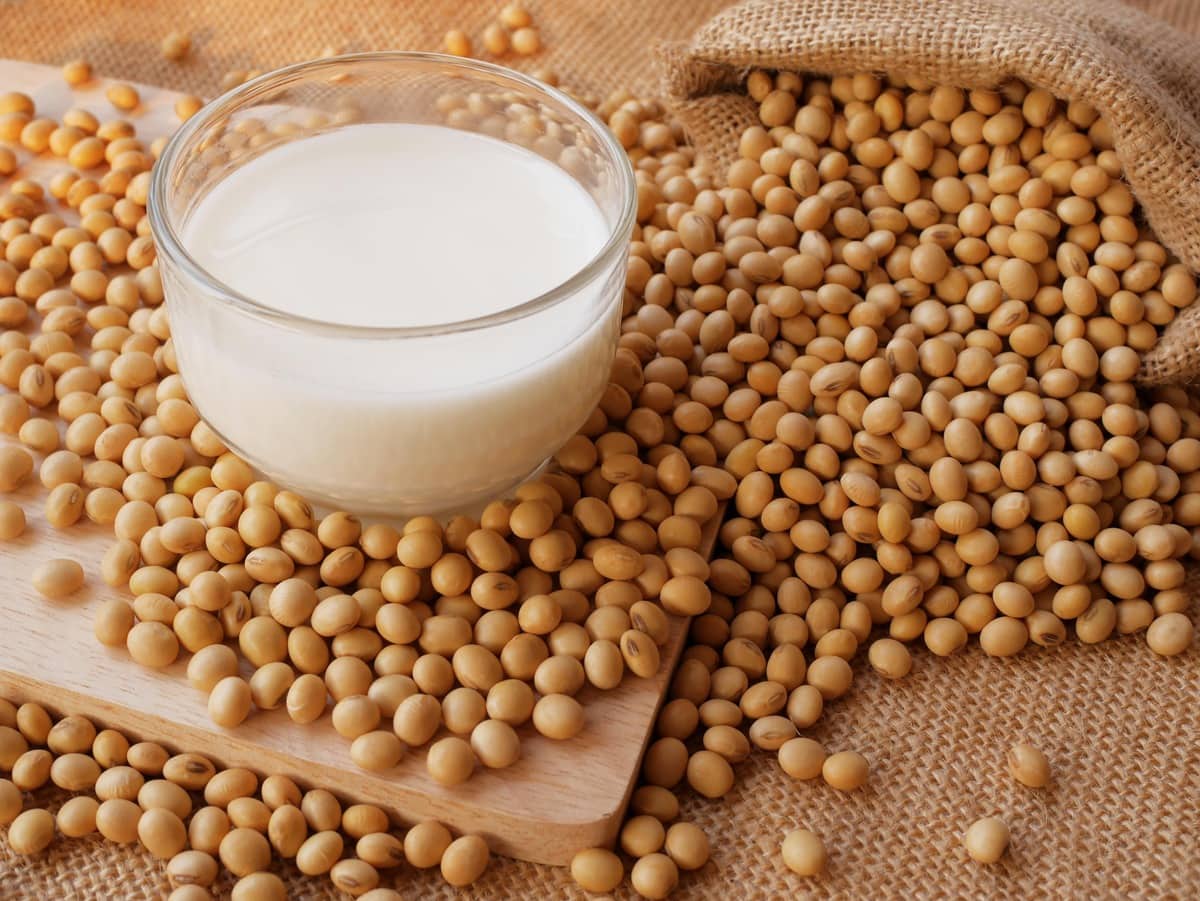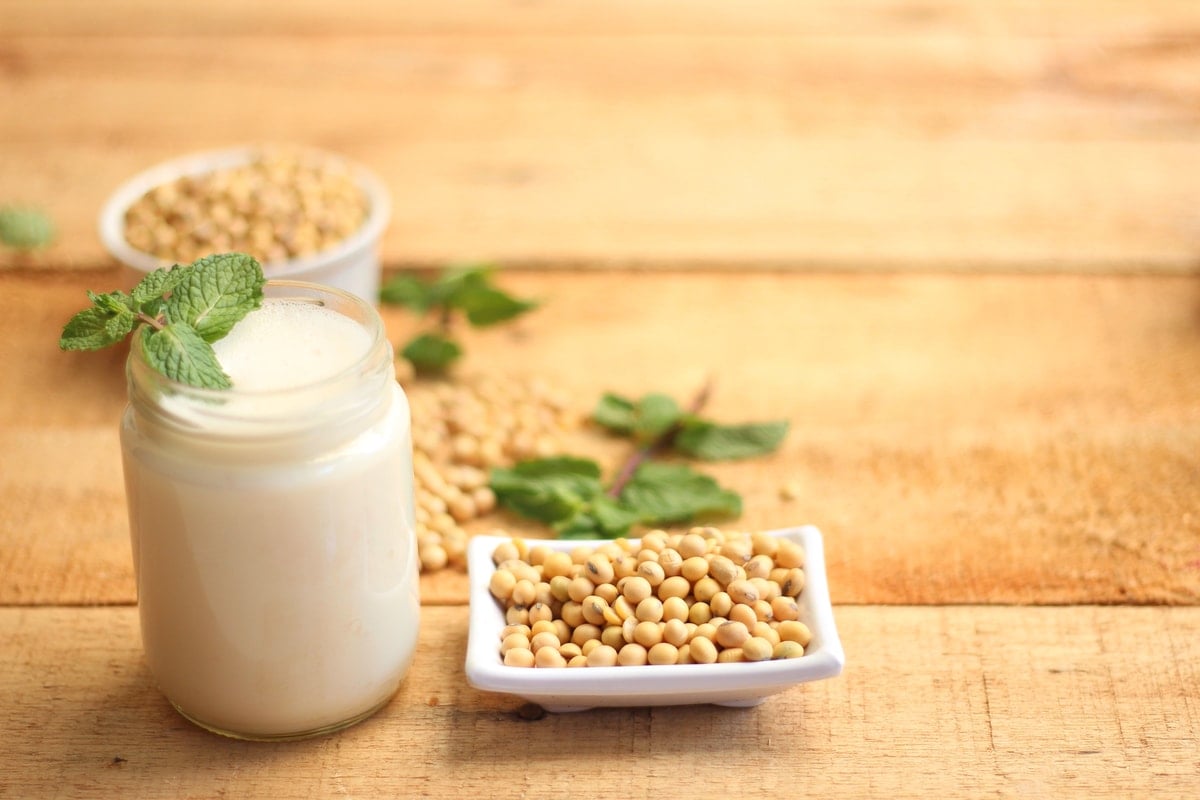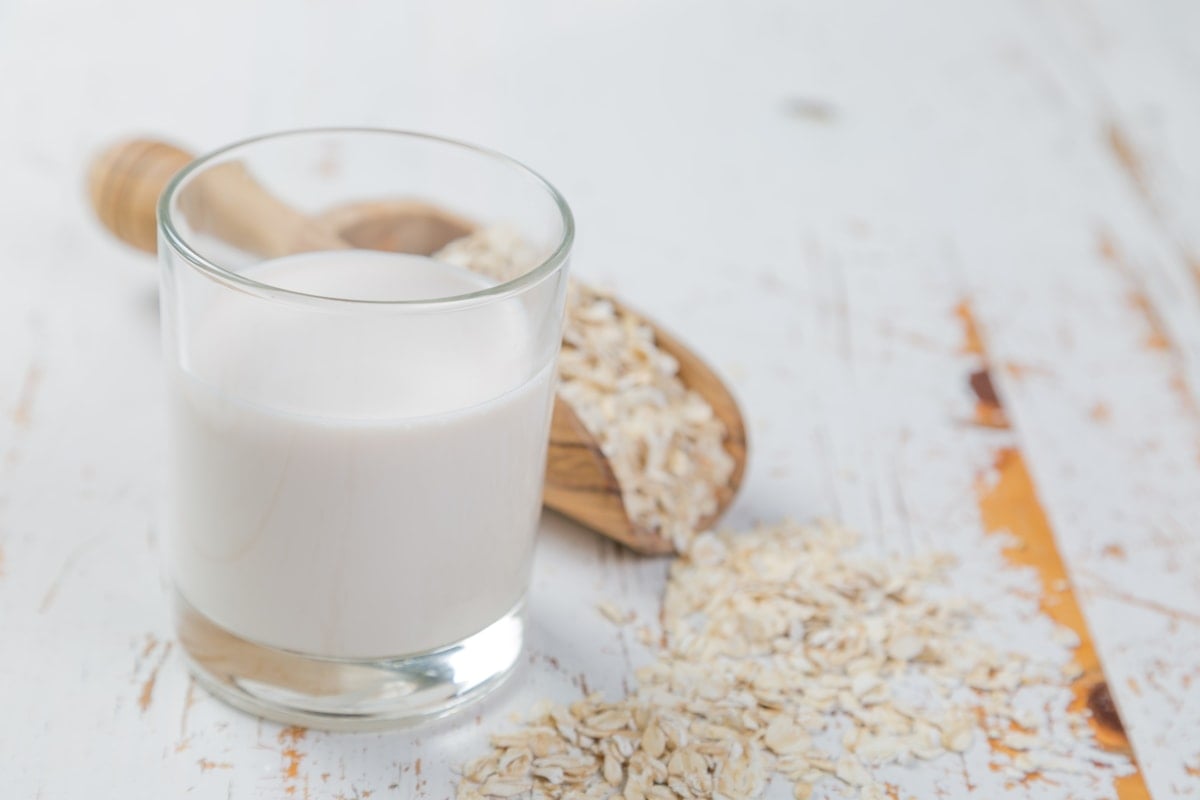Soy milk remains one of the most popular plant-based alternatives to dairy milk. It is highly nutritious, flavorful, and promises various health benefits.

Not everyone likes dairy milk and for some it actually does more harm than good. Whether you cannot drink dairy milk or just refuse to do so, you may be wondering if soy milk is the right alternative for you. This article aims to help you: we'll see why soy milk is so popular, some of the health benefits it provides, as well as a few side effects. At the end of the article, we will provide a brief summary of other plant-based milk alternatives to help you make the right choice for your diet.
Table of Contents
- Dairy Milk
- Why was soy milk introduced?
- What’s so special about it?
- Fortified with Vitamins vs. Unfortified Soy Milk
- Pros: What health benefits does soy milk provide?
- Cons: Can you consume too much soy milk?
- Other Types of Plant-Based Milk
- How to Make Homemade Soy Milk
- Adding Soy Milk To Your Diet
- Bottom Line: Soy Milk and Other Plant-Based Milk
Dairy Milk
Mammals produce a nutrient-rich liquid called milk, which serves as the main source of nutrition for young mammals. In particular, dairy milk typically comes from farm animals such as cows, sheep, and goats. More rarely, others collect milk from camels, horses, and donkeys as well. Cow's milk contains a wide variety of nutrients, which is why health experts consider it a basic part of a healthy, balanced diet. However, while cow's milk is undeniably good for our health, not everyone can or is willing to drink dairy milk. As such, plant-based milk alternatives to cow's milk were introduced.
Why was soy milk introduced?
One reason experts began looking for healthy alternatives to dairy milk was lactose intolerance. Experts estimate that about 65 to 70 percent of the world’s population has lactose malabsorption, a condition wherein the body is unable to digest all the lactose a person consumes. Lactose is a sugar naturally found in dairy milk and dairy milk products. And, those who experience digestive symptoms such as gas, bloating, or diarrhea after consuming anything with lactose have a condition called lactose intolerance.
At the same time, some people may have a different reason to drink plant-based milk instead of dairy milk. Because they follow a vegan diet, vegans cannot consume any food products that come from animals. These include the obvious ones such as meat, poultry, shellfish, eggs, dairy products, and even the less obvious ones such as mayonnaise and honey.
Additionally, some people cannot consume dairy milk and dairy milk products because of allergies, while some refuse to do so because they believe that milk alternatives are more sustainable and healthful options. Another health reason some people do not consume dairy milk is that it can worsen acid reflux symptoms. Of course, sometimes preference plays a part, as well.
What’s so special about it?
Soy milk, also known as soya milk or soymilk, has grown increasingly popular since the 19th century. Made from soybeans, it typically tastes mild and has a creamy flavor, but of course, different brands do not necessarily taste the same. However, experts say that soy milk is the best option for those who want to drink plant-based milk that tastes like dairy milk. And, in terms of nutrition, soymilk is also the closest non-dairy milk alternative.

Indeed, according to the United States Department of Agriculture (USDA), 1 cup (243 grams) of vanilla-flavored, unfortified soy milk contains the following nutrients:
- Calories: 131
- Protein: 7.95 grams
- Carbs: 15.3 grams
- Sugar: 9.7 grams
- Fiber: 1.46 grams
- Fat: 4.25 grams
- Calcium: 60.8 mg
- Iron: 1.56 mg
- Magnesium: 60.8 mg
- Potassium: 287 mg
Furthermore, experts say that soy milk contains some essential amino acids that can only be obtained through one’s diet. Additionally, many manufacturers also produce fortified soy milk, which contains added vitamins, minerals, and other essential nutrients.
Fortified with Vitamins vs. Unfortified Soy Milk
In general, doctors recommend for children aged 1 to 5 to drink mainly cow’s milk and water. For babies who are below 1 year in age, doctors say they should stick to only breast milk and infant formula. Meanwhile, children aged 1 to 2 should drink two to three cups of whole milk every day. And, for vegan families or for those with a dairy milk allergy or lactose intolerance, health experts say that unsweetened, fortified soy milk is the best alternative as it is nutritionally equivalent. Furthermore, experts recommend buying unsweetened milk alternatives as any added sugar can easily double the sugar content.
As a matter of fact, the United States Department of Agriculture (USDA) food database shows that 1 cup (243 grams) of unsweetened soy milk fortified with added calcium, vitamin A, and vitamin D contains the following nutrients:
- Calories: 80.2
- Protein: 6.95 grams
- Carbs: 4.23 grams
- Sugar: 0.996 grams
- Fiber: 1.22 grams
- Fat: 1.61 grams
- Calcium: 301 mg
- Iron: 1.12 mg
- Magnesium: 38.9 mg
- Potassium: 292 mg
- Retinol (Vitamin A): 503 IU
- Vitamin D: 119 IU
In the United States, fortified milk is more commonly seen than unfortified milk. Fortified and unfortified soy milk can be used the same way, but they differ in the nutrients they contain. Unfortified soy milk only contains about a quarter of the calcium found in dairy milk, but fortified soy milk can contain calcium five times that amount. Of course, each soy milk’s nutrient contents differ with each brand. And, the same is true for homemade soy milk. However, experts note that our bodies absorb naturally occurring calcium more easily than fortified calcium.
Pros: What health benefits does soy milk provide?
Soy milk contains soy protein, vitamins, minerals, antioxidants, and other essential nutrients that can provide various health benefits. For instance, the B vitamins in soy milk help prevent infections and help keep the cells healthy. The same vitamins can help avoid some forms of anemia, which can cause fatigue. Aside from that, soy milk contains fewer calories and has a lower sugar content compared to cow’s milk. As such, soy milk is a good choice for weight-watchers. In addition, soy milk can also provide other health benefits like the following:

May Lower Blood Pressure
Soybeans, which soy milk is made from, contain arginine and isoflavones, compounds that experts believe help regulate blood pressure levels. In a 2014 study, some women saw their diastolic blood pressure levels decrease by around 8% after eating a half-cup (43 grams) of soy nuts every day for eight weeks. Meanwhile, another study found that a daily intake of 65 to 135 mg of soy isoflavones led to a 3 to 6 mm Hg decrease in the blood pressure levels of people with high blood pressure. However, some studies suggest that only people with hypertension may benefit from this effect.
Improves Brain Health
Soy milk also contains a load of omega-3 fatty acids, healthy fats with powerful anti-inflammatory functions in the body. A healthy, balanced diet remains the only source of omega-3 fatty acids as the human body cannot produce them on its own. These fatty acids contribute to brain development from the womb up to the later stages in life. Moreover, studies have linked omega-3 fatty acids with a reduced risk of dementia and Alzheimer’s disease.
Contributes to Better Heart Health
Aside from brain health, omega-3 fatty acids also contribute to better heart health. In fact, the American Heart Association (AHA) recommends that people with no history of heart disease eat at least 6 to 8 ounces of fish each week. Fish contains a high amount of omega-3 fatty acids, with some varieties containing more than others. Additionally, a review from 2017 linked diets rich in soy foods with a 20% lower risk of stroke and a 16% lower risk of heart disease.
Reduces Symptoms of Menopause
The isoflavones (a phytoestrogen) in soy milk also help reduce the symptoms of menopause and help improve fertility for women. During menopause, women’s estrogen levels decrease, which can lead to a variety of unpleasant symptoms, including fatigue, hot flashes, chills, mood changes, and sleep problems. In fact, a review found that taking soy isoflavone supplements for 6 weeks to 12 months led to a significant decrease in the frequency and severity of hot flashes. Additionally, a 2017 study found that soy isoflavones also helped relieve some symptoms of menopause and perimenopause, the years leading up to menopause.
Cons: Can you consume too much soy milk?
Experts say that drinking soy milk moderately can provide many health benefits. On the other hand, consuming a huge quantity of soy foods could lead to some health risks. Some of those side effects include:
May Lead To Reduced Ovarian Function
While the isoflavones that soy milk contains provide many health benefits, experts say moderation is still key. In 2010, a review from the Journal of Nutrition linked the excessive consumption of isoflavones to a reduced ovarian function. However, according to doctors, healthy adults do not need to worry as long as they consume soy milk responsibly. After all, one would need to consume over 100 mg of soy isoflavones, equivalent to 16 cups of soy milk, before it starts becoming harmful.
May Affect Thyroid Function
Additionally, experts warn that soy milk and other soy products like soy yogurt may affect one’s thyroid function. On one hand, a review of 14 studies by the Loma Linda University found that people with healthy thyroids need not worry. On the other hand, people with under-active thyroids must be wary of how much soy they consume. Moreover, a 2016 review found that although soy products may interfere with the body’s absorption of thyroid medication, it only does so when too much is consumed. However, just to be safe, experts advise waiting at least four hours after consuming soy before taking any thyroid medication.

Other Types of Plant-Based Milk
If you find the taste of soy milk not to your liking, other types of plant-based milk exist as a good alternative. However, when comparing all plant-based milk alternatives, experts say that soy milk remains the most nutritionally similar to cow milk. To help you get an idea of what nutrients the different kinds of milk alternatives contain, take a look at their differences below.
Almond Milk
Made from ground almonds and water, those allergic to almonds or nuts should avoid this type of plant-based milk. Unsweetened almond milk typically contains fewer calories than other types of milk. And, some health enthusiasts prefer this type because it contains no saturated fat and is naturally lactose-free.
Experts say that almond milk is a great choice for those who want to lose weight. But, on the other hand, those who are not looking to lose weight will need other sources of calories and protein to meet their daily needs. Good sources include fish and beans. Additionally, because it is low in calories and protein, health experts do not recommend this type of milk for everyone, especially children.
According to the USDA, one cup (244 grams) of unsweetened almond milk contains:
- Calories: 36.6
- Carbohydrates: 3.2 g
- Sugar: 1.98 g
- Total Fat: 2.34 g
- Protein: 0.98 g
- Calcium: 449 mg
Furthermore, almond milk typically contains little calcium. To remedy this, some manufacturers add calcium and other vitamins to make fortified almond milk. However, remember that the human body does not absorb fortified calcium as easily as it does naturally occurring calcium. Thus, experts recommend consuming other sources of calcium, such as dark leafy greens like spinach.
Coconut Milk
The combination of coconut cream and water results in coconut milk, another popular alternative to dairy milk. People with nut allergies need not worry, as this type of milk is safe for them to consume. Compared to the other dairy milk alternatives, coconut milk contains more fat. Additionally, one should take note that coconut milk is a high-calorie food.
The USDA food database lists that one cup (244 grams) of coconut milk contains:
- Calories: 75.6
- Carbohydrates: 7.12 g
- Sugar: 6.1 g
- Total Fat: 5.8 g
- Protein: 0.512 g
- Calcium: 459 mg
Just like almond milk, many coconut milk manufacturers add calcium and other vitamins to make fortified milk. However, health experts recommend buying the unsweetened kind as sweetened kinds can easily have more than twice the amount of sugar.
Rice Milk
Rice milk is made from milled rice and water. Experts claim that rice milk is the least likely milk to cause allergies, which makes it a good choice for those with allergies or lactose intolerance. Additionally, rice milk has the most carbohydrates per cup. As per the USDA food database, 8 fl. oz. (240 grams) of unsweetened rice milk contains the following nutrients:
- Calories: 113
- Carbohydrates: 22 g
- Sugar: 12.7 g
- Total Fat: 2.33 g
- Protein: 0.672 g
- Calcium: 283 mg
Similar to soy milk and almond milk, rice milk does not naturally contain calcium and vitamin D. However, as with the other milk alternatives, fortified rice milk can be bought, as well.

Oat Milk
Last on our list, oat milk has a mild, creamy flavor. Those who drink oat milk say that it is a good choice of milk for cereals, hot beverages, and drinking on its own. However, experts say that people with gluten intolerance or celiac disease should not drink oat milk. Additionally, one should note that unflavored oat milk contains the highest amount of calories and carbohydrates out of all plant-based milk varieties.
According to the USDA, one cup (240 mL) of Oatly’s original oat milk contains:
- Calories: 120
- Carbohydrates: 16 g
- Sugar: 7.01 g
- Total Fat: 4.99 g
- Protein: 3 g
- Calcium: 350 mg
To make oat milk more nutritionally balanced and to make it an overall healthier drink, many manufacturers fortify it with added vitamins and minerals.
How to Make Homemade Soy Milk
As one of the most popular dairy milk alternatives, soy milk can be easily found and bought in grocery stores, health food stores, or even online. Alternatively, you can also make your own homemade soy milk. And, health enthusiasts say, making homemade soy milk is easy. In fact, to make soy milk at home, you will only need two ingredients—soybeans and water. Take note that experts recommend using organic or homegrown beans whenever possible.
First, to make about 2 cups (500 ml) of soy milk, you will need a half-cup (80 grams) of dried soybeans and 4 cups (1 L) of water. Soak the soybeans in water overnight, or ideally for at least 12 hours. Drain the soybeans, and remove the outer skins if you want to. Those who make homemade soy milk say that removing the outer skin is optional. However, the milk will turn out with a better texture if the outer skins are removed.
Next, blend the soybeans and 3 cups (750 ml) of water together until the mixture is almost smooth. Afterward, strain the mixture thoroughly; you can use anything you have—a fine-mesh strainer, cheesecloth, or even a napkin. Once strained, pour the mixture into a pot and add the last cup (250 ml) of water to the mixture. Then, bring it to a boil over medium heat while stirring occasionally. Make sure to skim the foam, and after about 20 minutes, turn off the heat. Let the soy milk cool, then add any other ingredients you want to. Some recipes add salt, sugar, vanilla extract, cocoa powder, or ground cinnamon into the soy milk, but you can also choose not to. Lastly, soy milk can last for about 3 to 5 days in the fridge as long as it is kept in a sealed container.
Adding Soy Milk To Your Diet
However, before adding soy milk to your diet, make sure you have already consulted your doctor about it. With that said, incorporating soy milk into your diet does not have to be difficult. It can be as simple as doing any of the following:
- Add soy milk to a smoothie
- Use soy milk when baking
- Eat cereal with soy milk
- Make a fruit salad with soy milk
- Use soy milk to make sauces
- Use soy milk in recipes that call for milk, such as soups

Bottom Line: Soy Milk and Other Plant-Based Milk
If you have a soy allergy, then soy milk may not be the right dairy milk substitute for you. Experts recommend avoiding soy milk if even one person in the household is allergic to soy. After all, even soy milk used in recipes can cause allergic reactions. However, soy milk remains a good choice if no one in your household has a soy allergy. Indeed, health experts say that fortified soy milk is nutritionally closest to dairy milk out of all alternatives. Fortified soy milk contains added vitamins and minerals such as calcium, while unfortified does not.
On the other hand, for those allergic to soy or for those who do not enjoy the taste, other dairy milk substitutes exist, as well. These include almond milk, coconut milk, rice milk, and oat milk. Furthermore, each type of plant-based milk has different nutritional profiles and health benefits. And, of course, each type also has different side effects.
If you decide to include soy milk in your diet after careful consideration, experts recommend buying unsweetened soy milk. They say that sweetened versions can easily contain more than twice the sugar content of unsweetened soy milk. And, since soy milk does not naturally contain calcium, experts recommend buying unsweetened fortified milk. Make sure that the soy milk contains calcium and vitamin D, which brings the nutritional contents even closer to dairy milk.
Sources:
https://www.niddk.nih.gov/health-information/digestive-diseases/lactose-intolerance/definition-facts
https://en.wikipedia.org/wiki/Dairy_product
https://www.healthline.com/nutrition/foods/milk
https://en.wikipedia.org/wiki/Milk
https://www.webmd.com/diet/vegan-diet-overview
https://www.ncbi.nlm.nih.gov/pmc/articles/PMC3166669/
https://www.whattoexpect.com/toddler-nutrition/soy-milk-for-children.aspx
https://en.wikipedia.org/wiki/Soy_milk
https://www.healthline.com/nutrition/fortified-milk
https://www.thespruceeats.com/is-soy-milk-healthy-or-not-765047
https://www.medicalnewstoday.com/articles/273982
https://www.webmd.com/diet/health-benefits-soy-milk
https://my.clevelandclinic.org/health/articles/17290-omega-3-fatty-acids
https://www.healthline.com/nutrition/omega-3-fish-oil-for-brain-health
https://www.healthline.com/nutrition/is-soy-bad-for-you
https://www.goodhousekeeping.com/health/diet-nutrition/a20707020/is-soy-good-or-bad-for-you/
https://www.medicalnewstoday.com/articles/324746
https://www.healthline.com/health/milk-almond-cow-soy-rice
https://www.medicalnewstoday.com/articles/325425
https://www.healthline.com/nutrition/coconut-milk
https://simpleveganblog.com/homemade-soy-milk/
https://www.ucsfhealth.org/education/20-ways-to-increase-soy-in-your-diet

Leave a Reply